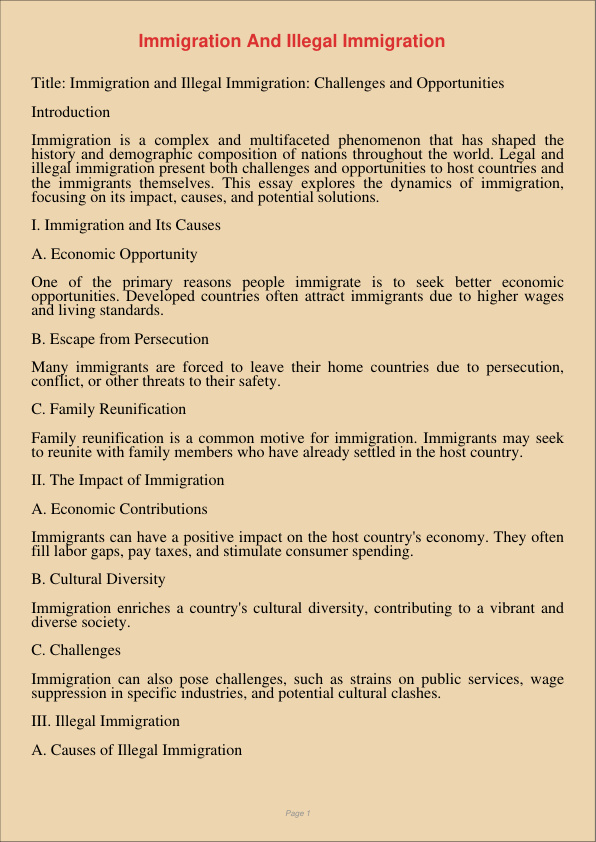Immigration And Illegal Immigration
Jan 12, 2024
illegal immigration
immigration
Family & Consumer Science
Social science
Title: Immigration and Illegal Immigration: Challenges and Opportunities
Introduction
Immigration is a complex and multifaceted phenomenon that has shaped the history and demographic composition of nations throughout the world. Legal and illegal immigration present both challenges and opportunities to host countries and the immigrants themselves. This essay explores the dynamics of immigration, focusing on its impact, causes, and potential solutions.
I. Immigration and Its Causes
A. Economic Opportunity
One of the primary reasons people immigrate is to seek better economic opportunities. Developed countries often attract immigrants due to higher wages and living standards.
B. Escape from Persecution
Many immigrants are forced to leave their home countries due to persecution, conflict, or other threats to their safety.
C. Family Reunification
Family reunification is a common motive for immigration. Immigrants may seek to reunite with family members who have already settled in the host country.
II. The Impact of Immigration
A. Economic Contributions
Immigrants can have a positive impact on the host country’s economy. They often fill labor gaps, pay taxes, and stimulate consumer spending.
B. Cultural Diversity
Immigration enriches a country’s cultural diversity, contributing to a vibrant and diverse society.
C. Challenges
Immigration can also pose challenges, such as strains on public services, wage suppression in specific industries, and potential cultural clashes.
III. Illegal Immigration
A. Causes of Illegal Immigration
Economic reasons, limited legal pathways, and unsafe living conditions in home countries can drive individuals to enter a country illegally.
B. Consequences of Illegal Immigration
Illegal immigration poses legal, social, and economic challenges. It can strain law enforcement, contribute to human trafficking, and limit access to healthcare and education for undocumented individuals.
IV. Solutions and Policy Considerations
A. Comprehensive Immigration Reform
Implementing comprehensive immigration reform can address legal pathways, enhance border security, and provide undocumented immigrants with a path to legal status.
B. Economic and Labor Market Policies
Policies that regulate the labor market and address the demand for certain skills can help manage immigration effectively.
C. Humanitarian Initiatives
Providing humanitarian aid and supporting diplomatic efforts to address the root causes of immigration can mitigate forced migration.
D. Public Awareness and Integration Programs
Fostering public awareness and implementing integration programs can help smooth the cultural adaptation of immigrants in host countries.
Conclusion
Immigration is a multifaceted issue with both challenges and opportunities for host countries and immigrants. Understanding the causes and consequences of immigration, both legal and illegal, is essential for developing effective policies and ensuring that immigration continues to contribute positively to societies around the world. Balancing economic interests, humanitarian concerns, and cultural diversity can lead to comprehensive solutions that benefit everyone involved.
